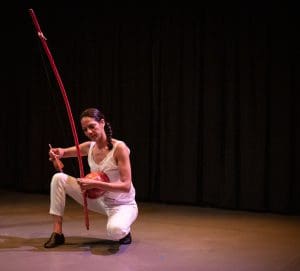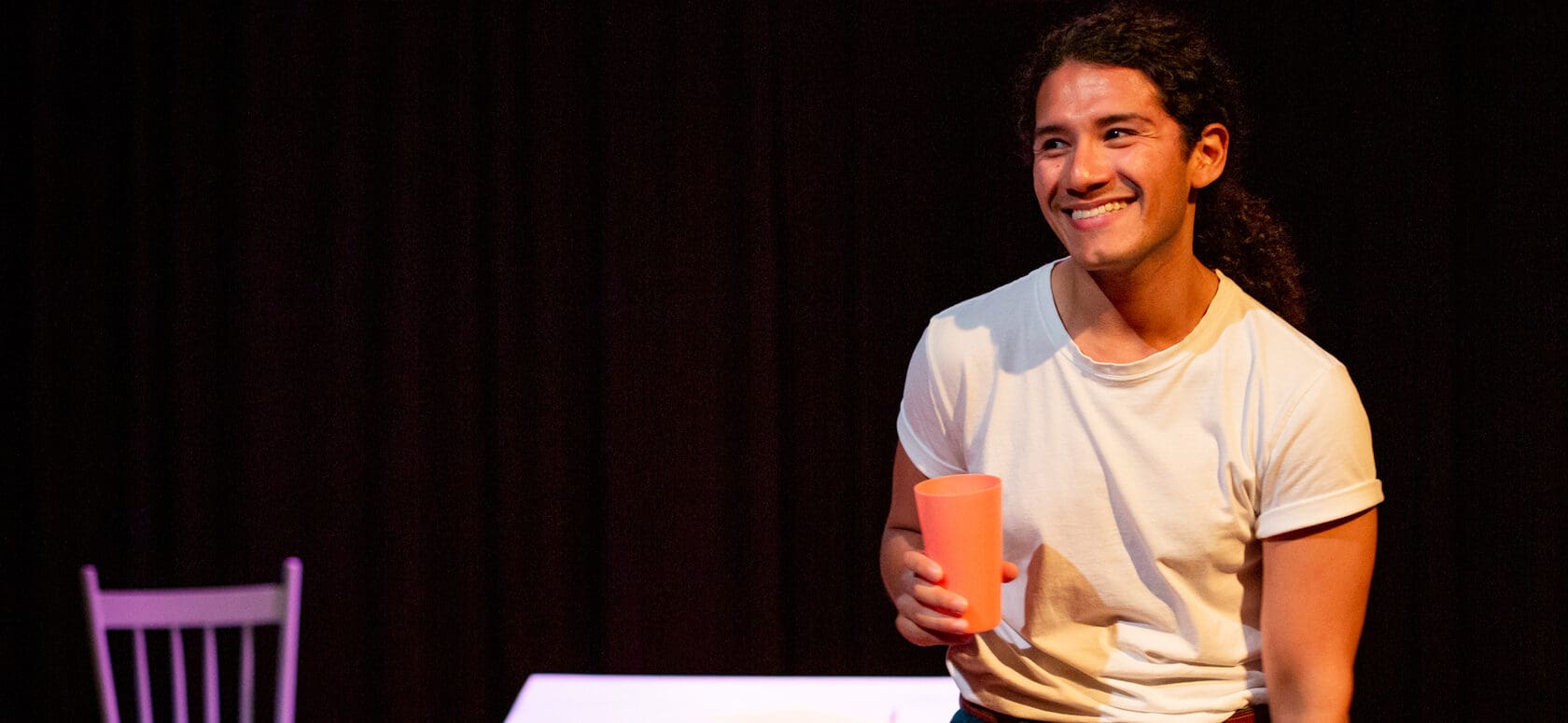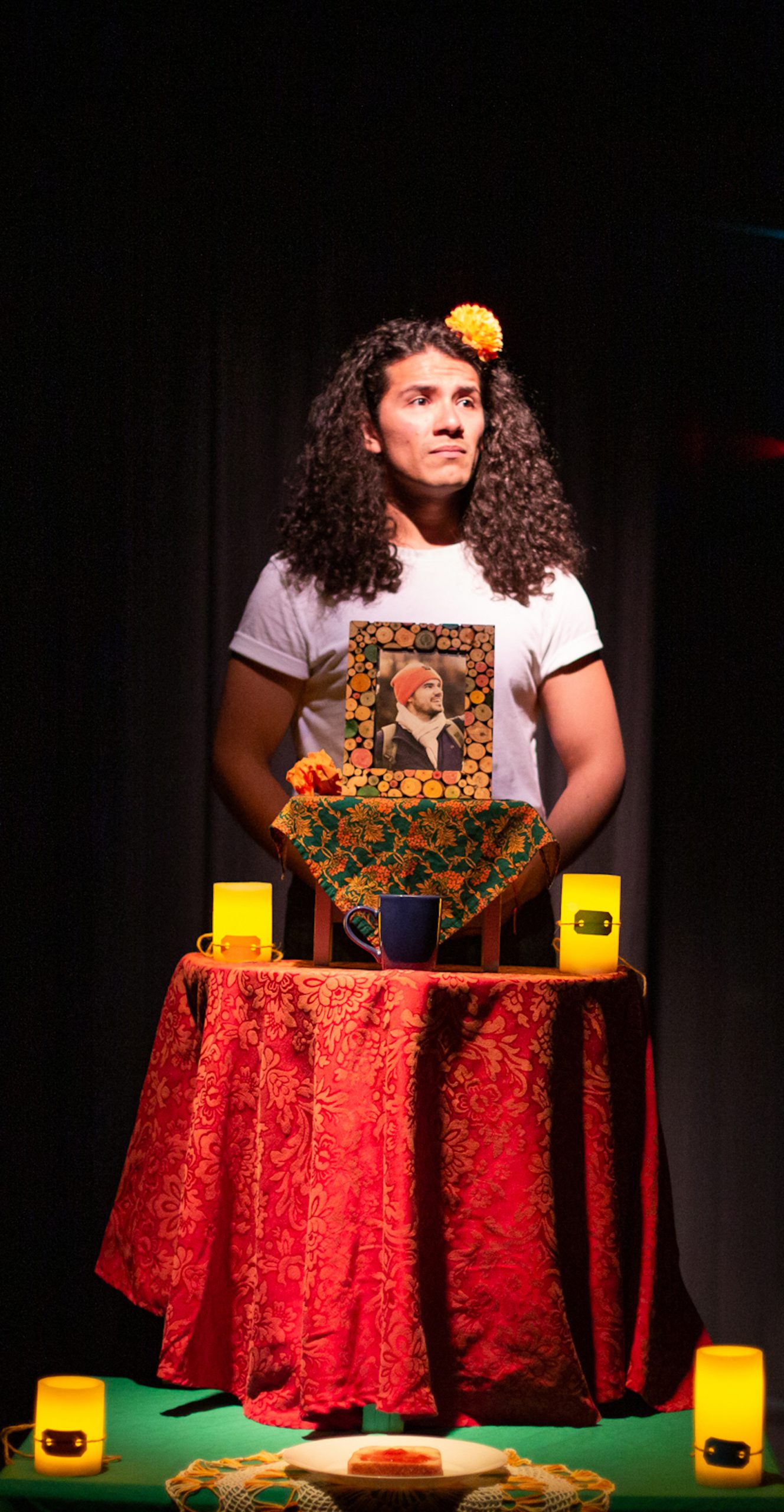Saudade by Vanessa Cardoso-Whelan
& Altar by Santiago Guzmán
Saudade by Vanessa Cardoso-Whelan and Altar by Santiago Guzmán
Reviewed by Sobia Shaikh
I had the privilege of immersing myself in an extraordinary double bill, Vanessa Cardoso-Whelan’s Saudade and Altar, by Santiago Guzmán, at the Gros Morne Theatre Festival in Cow Head. These two distinct yet harmonious plays unveiled an artful spectrum of experience from Brazil, Mexico and Canada.
I attended these plays during a summer camping trip to Gros Morne. A departure from my rustic camping experience, the theatre offered me a welcome contrast to camping clothes, mosquito bites, and tents. Arriving with minutes to spare, I bought my ticket. The two women at the box-office were chatty and kind. As I walked briskly with my cane, I overheard someone radioing to wait for me—the last straggler. A friendly face directed me to open seats on the floor of the crescent-moon-shaped stage. Grateful that I didn’t need to climb stairs, I settled down amidst the sea of mostly older, white faces.
As I looked up, self-consciously pulling my shawl closer against my body, I wondered whether my fellow audience members were tourists or local folk, and what their assumptions were about art in Newfoundland & Labrador. Would they understand the diversity of Newfoundland theatre as I had been privileged to experience it? How would these plays be understood against a backdrop of what is often seen through stereotypes of Newfoundlanders and Labradorians?
Saudade: A Melodic Journey of Longing
Vanessa Cardoso-Whelan’s play, Saudade, is a collection of personal reflective narratives and movement. Darkness envelops the stage, the sounds of the ocean and wind of St. John’s whispers through the theatre. When the house lights turn on, Cardoso-Whelan sits atop a ladder, stage-right, bathed in spotlight, moving with grace.
This performance conjures a spectrum of emotion, from wistful melancholy to radiant happiness. Rooted in the Brazilian and Portuguese sentiment of saudade—a term that encapsulates profound yearning and nostalgia—the production crafts an immersive experience, weaving memories into bittersweet story.
Cardoso-Whelan’s skillful performance gives shape to the essence of saudade—an emotion that she tells the audience defies easy translation to English. And yet, Cardoso-Whelan offers more than mere translation—she provides resonance with the concept of saudade. Her movement fuses embodied memory, emotion and wistful evocations of Newfoundland seas and shores. She channels the depths of longing, loss, loneliness, and the bittersweet joy of cherished stories—the very heart of saudade.

photo by Mandy Keeping

photo by Mandy Keeping
Altar: A Story of Love, Loss, and Healing
Following the evocative exploration of saudade, Altar is a tale of love, loss, and the pursuit of healing. Altar is brought to life by Santiago Guzmán and directed by Meghan Greeley. Guzmán’s passionate acting style and ability to capture the audience remind us that longing, loss and healing are indeed translatable.
Eugenio (played by Guzmán), a newcomer to Corner Brook, grapples with heartbreak after his boyfriend mysteriously disappears. The concept of being “ghosted” takes a supernatural turn as Eugenio seeks closure through an ancient tradition—El Día de Muertos. Altar magically moves us back and forth through the western shores of Newfoundland to Eugenio’s family home in Mexico.
Eugenio engages the audience, inquiring about their familiarity with Tinder. An unscripted voice in the audience cries out, “You’re looking for a girlfriend!” Yet, as Eugenio’s story unfolds, it becomes apparent that he is indeed seeking a boyfriend. In this moment, I witness another form of translation—this time, one that transcends sexual orientation along with cultural boundaries. I feel relieved knowing heteronormative and ethnocentric norms are simultaneously being challenged.
Eugenio’s transformation unfolds as a delicate balance between heartache and hope, one which resonates with anyone who has lost and reconnected with love. Altar delves into disconnection, bridging worlds, and ultimately, reconnection with one’s roots. In mourning the loss of his romantic relationship, Eugenio discovers the enduring love of his best friend, sister, and father—love that was ever-present but had seemed to be disrupted through time, misunderstanding, and distance. The creation of an altar emerges as a bridge between the living and the departed and as a metaphor for reconciling past pain and rejuvenation. Eugenio’s emotional journey speaks to yearnings for healing, connection, love, and understanding.

photo by Mandy Keeping
Harmonious Performance, Translation and Resonance
The synergy between Saudade and Altar is undeniable. Both plays leave the audience introspective and moved. The juxtaposition of Saudade’s yearning and Altar’s healing adds depth to this interplay, while Cardoso-Whelan and Guzmán breathe life into their roles, inviting us to connect deeply with their characters and stories. The authenticity of their emotions draws us into their world, where their experiences become ours.
The performances are celebrations of translation and resonance in the context of a dynamic Newfoundland & Labrador. Their ability to navigate diverse traditions, language, movement, and story showcases the power of Newfoundland theatre to delve into shared experience, enhanced by emotion and connection.
This is not the last opportunity to see works from these talented playwrights and performers. Among other projects, Guzmán’s Altar will be going on tour in 2024 in Nova Scotia, New Brunswick and Labrador. Among several multi-disciplinary art projects, Cardoso-Whelan will be performing during a tour of Supper Club (by Willow Kean) in Newfoundland & Labrador. Guzmán and Cardoso-Whelan are collaborating again, along with Nabila Qureshi, for a 2024 production of Newfoundlanded.
Sobia Shaheen Shaikh is a creative writer, playwright, academic author and community organizer, living in St. John’s, NL. She is working on a play called Braiding Peonies (working title) workshopped at the 2023 Women’s Work Festival, NL and Rumble Theatre Festival, BC.
